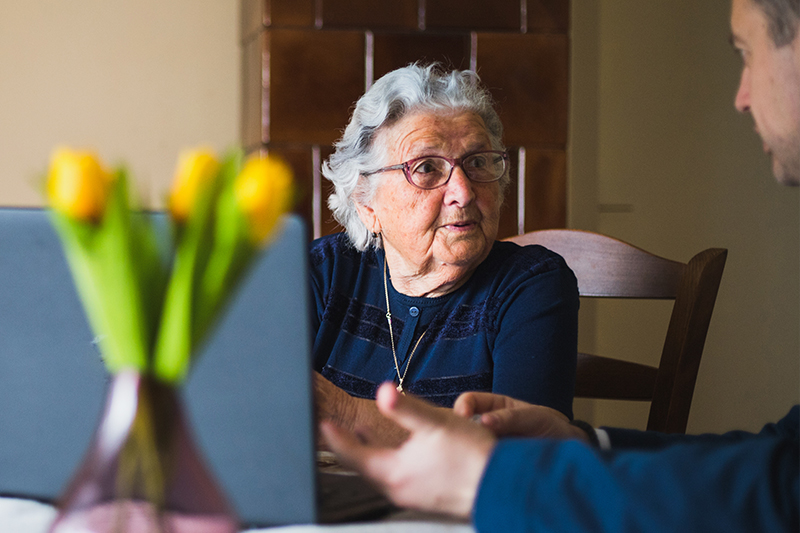
Senior Finances: What to Do When a Frugal Senior Refuses Care Many of today’s older adults were raised in the Great Depression. They lived through a period when the country was cutting corners and pinching pennies. Frugality was embedded in many of them while very young and quite often remains firmly in place for life, often impacting senior finances throughout aging. So what occurs when an older adult is in need of care at home, has the financial ability to afford care, but does not want to spend the money required for that care? First, empathize. Understand that the person’s viewpoint is valid and based on past life experiences. If the senior seems to be reluctant to the notion of spending money for the care they need, remind yourself of the emotions behind the behaviors. An added layer of difficulty might be in simply accepting the need for care altogether, something which is far beyond mere frugality. Spend some time shopping with the senior. Costs were far different years ago than they are today, for everything from a gallon of milk to a…

Family Caregiver Tips: How to Cope with Feeling Unappreciated From the time you woke up this morning up until the end of an exhausting day, you’ve given your all to your older loved one. You provided help with showering and dressing, prepared nutritious meals, cleaned the house, all while making sure a senior loved one was happily involved in meaningful activities, made it to their 3:00 hair appointment, and picked up groceries and prescriptions afterwards. And while you are not doing any of these things for a pat on the back, a simple “thank you” would be nice – but is rarely offered. If you’re feeling under-appreciated or completely unappreciated altogether, you’re not alone. This is definitely a frequent occurrence in caregiving for a number of reasons, and if not addressed, may lead to caregiver depression or burnout. These family caregiver tips can help. Start modeling appreciative behavior. Let the senior see by example how good it feels to be appreciated by sincerely thanking them whenever the chance arises. If they fold and hang…

4 Ways to Foster and Strengthen Senior Friendships f you’ve ever watched young children on the playground, you know how effortlessly friendships are formed. A small group might be playing hide-and-seek, and a newcomer dashes over with a breathless, “Can I play?” More often than not, the reply is a resounding, “Yes!” and thus – instant friends. If only it were that simple as adults! Senior friendships offer a wealth of benefits, and they are especially essential for older adults who have been impacted by COVID-related isolation protocols. So how could you help the older adults you love to increase socialization and also make some new friends? Short of jumping into a pick-up game of tag, try these guidelines: Join a club. Brainstorm topics of interest with your family member: knitting, reading, gardening, fishing, sports. Next, search on the internet for groups in your neighborhood that meet up to enjoy those activities together. The neighborhood senior center is likely to be a terrific resource as well. If you cannot find an…

Learn How to Advocate for Ageing Parents by Improving These 4 Skills “Unless someone like you cares a whole awful lot, nothing is going to get better. It’s not.” – Dr. Seuss, The Lorax Learning how to advocate for aging parents isn’t always easy; but advocating for those you love is perhaps one of the greatest honors – and responsibilities – you’ll have as a family caregiver. It means fully comprehending the other person’s wishes and needs, and communicating them to those who can help ensure they are fulfilled. If the role seems daunting and perhaps more than you feel equipped to carry out, or if you are just now having to learn how to advocate for ageing parents, there are several steps you can take to strengthen the skills you’ll need to be most effective. Observe. It may seem to go without saying, but with so many things vying for your attention, it can be easy to pay less attention than needed to subtle shifts in a senior’s condition, behaviors, or mood. It’s helpful to first make sure your own self-care needs are met so you’re…

Questions to Ask Aging Parents Today for a Better Tomorrow We’re all familiar with Benjamin Franklin’s sage advice: “Don’t put off until tomorrow what you can do today.” This has special significance when it comes to knowing the questions to ask aging parents as you plan for the future: from the practical knowledge of what their wishes are for their remaining lifetime, to what their favorite flavor of ice cream was as a child – and anything in between. It’s a good idea to let your parents know that you have some questions you’d like to ask, and then schedule a time that will be uninterrupted, inviting siblings or other family members to attend as appropriate. Then prepare your questions in advance, thinking through ideas such as: Do you have a power of attorney? A do-not-resuscitate order? A will and living will in place? Are these documents gathered together in one secure but easily-accessible location? What are your wishes for care, if the time should come that it’s necessary? A nursing home? Assisted living facility? Or professional…

How to Help Seniors Experience More Joy It has taken nearly 80 years and a slew of research studies to determine the result: wealth and a good genetic makeup really have little to do with our level of joy. The Harvard Study of Adult Development launched in 1938, delving into the lives of high-profile participants such as John F. Kennedy and Ben Bradlee. Over the years, it has been expanded to incorporate inner-city residents along with offspring from the original Harvard elite, and the outcomes were surprising, to say the least. It was determined that the most effective predictors of a long and happy life were not genetics, IQ, fame, finances, or social class but simply close relationships. Robert Waldinger, director of the research study and a psychiatrist at Massachusetts General Hospital as well as a professor of psychiatry at Harvard Medical School, explains, “The people who were the most satisfied in their relationships at age 50 were the healthiest at age 80. Loneliness kills. It’s as powerful as smoking or alcoholism.”…




















